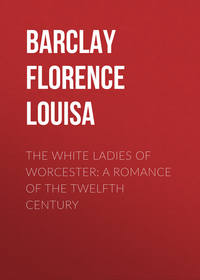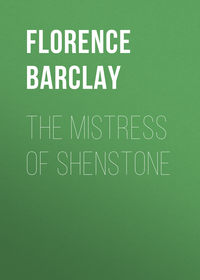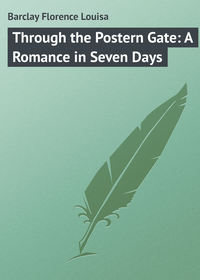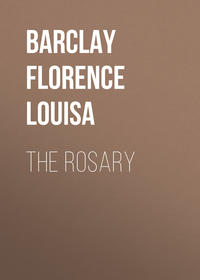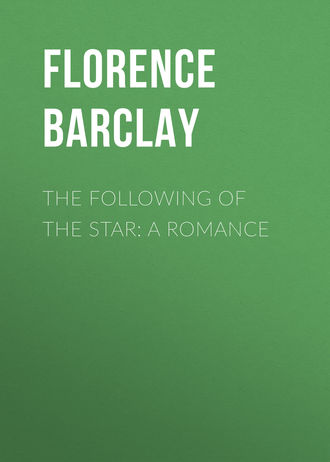 полная версия
полная версияThe Following of the Star: A Romance
"Let's sit quite still, David, and realise that the whole thing is safely over, and we are none the worse for it; and have got all we wanted in the world."
David said nothing. He had stopped "not arguing."
The train sped onward.
A sense of complete calm and rest came over the two who sat silent in their compartment, moving so rapidly toward the moment of inevitable parting. Diana's head was so near to David's that a loose strand of her soft hair blew against his face. She let her muff drop, but still held his hand to her breast. She closed her eyes, sitting so still that David thought she had fallen asleep.
At length, without stirring, she said: "We shall write to each other, Cousin David?"
"If you wish."
"Of course I wish. Will you promise to tell me exactly how you are?"
"I never speak, think, or write, about my own health."
"Tiresome boy! Do you call this 'obeying' me?"
"I did not promise to obey you."
"Oh, no; I forgot. How wickedly one-sided the marriage service is! That is one reason why I always declared I never would marry. One law for the man, and another for the woman; and in a civilized country! We might as well be Hottentots! And what a slur on a woman to have to change her name – often for the worse. I knew a Miss Pound who married a Mr. Penny."
David did not laugh. He had caught sight of the distant ships on Southampton water.
"Everybody made endless puns on the wedding-day," continued Diana. "I should have been in such a rage before the reception was over, had I been the bride, that no one would have dared come near me. It got on her nerves, poor girl; and when some one asked her just as they were starting whether she was going to take care of the Penny and leave the Pounds to take care of themselves, she burst into tears, and drove away, amid showers of rice, weeping! I think Mr. Penny must have felt rather 'cheap'; don't you? Well, anyway, I have kept my own name."
"You have taken mine," said David, with his eyes on the masts and funnels.
"How funny it will seem to get letters addressed: Mrs. David Rivers. If my friends put D only, it might stand for 'Diana.' David – " she turned her head suddenly, without lifting it, and her soft eyes looked full into his dark ones – "David, what shall you call me, when you write? I am no longer Miss Rivers, and you can hardly begin your letters: My dear Mrs. Rivers! That would be too formal, even for you! At last you will have to call me 'Diana.'"
David smiled. "Not necessarily," he said. "In fact, I know how I shall begin my letters; and I shall not call you 'Diana.'"
"What then?" she asked; and her lips were very close to his.
David sat up, and touched the springs of the window-blind.
"I will tell you, as we say good-bye; not before. Look! We are running through Southampton. We shall be at the quay in two minutes."
CHAPTER XX
WITH THE COMPLIMENTS OF THE COMPANY
Diana followed David up the gangway of the big liner, and looked around with intense interest at the floating hotel he was to inhabit during so many days; the vessel which was to bear him away to the land from which he never intended to return.
Diana experienced an exhilarating excitement as she and David stepped on board, amid a bustling crowd of other passengers and their friends; the former already beginning to eye one another with interest; the latter, to follow with wistful gaze those from whom they would so soon be parted.
Diana had left the train, at the dock station, with very different sensations from those with which she had entered it at Waterloo. She now felt so indescribably happy and at rest; so completely reassured as to the future. David had been so tender and understanding, so perfect in all he had said and done, when once she had succeeded in making him realise how much more their new relationship meant to her, than it did to him. He had so patiently allowed her to hold his hand, during the remainder of the journey. She could feel it still, where she had pressed it against her bosom. It seemed to her that she would always feel it there, in any time of doubt or of difficulty. It must be because of David's essential goodness, that his touch possessed such soothing power. The moment he had laid his hand on hers, she had thought of the last verse of his favourite hymn.
Her car, sent down from town the day before, to be in readiness to take her home, awaited her as near the gangway of the steamer as the regulations of the wharf would allow. It was comforting to know that there would not be the need for a train journey, after David's departure. It might have seemed lonely without him. Once safely tucked into her motor, she was at home, no matter how long the run to Riverscourt might chance to be.
David caught sight of the car; and she had to stand, an amused spectator, while he ran quickly down to say good-bye to her footman and to her chauffeur. She saw the wooden stiffness of the footman, and the iron impassivity of the chauffeur, subside into humanity, as David shook them each by the hand, with a kindly word of remembrance and farewell. Both automata, for the moment, became men. Diana could see the glow on their faces, as they looked after David. Had he tipped them each a five-pound note, they would have touched their hats, without a change of feature. In the warmth of this farewell, they forgot to touch their hats; but David had touched their hearts, which was better; and their love went with him, as he boarded the steamer.
This little episode was so characteristic of David. Diana thought it over, with tender amusement in her eyes, as she followed him up the gangway. Wherever he went he won the hearts of those who served him. He found out their names, their joys and sorrows, their hopes and histories, with astonishing rapidity. "I cannot stand the plan of calling people by their occupation," he used to say. "Like the crude British matron in the French hotel, who addressed the first man she met in a green apron, as 'Bottines!'"
So "Boots," "Waiter," and "Ostler," became "Tom," "Dick," and "Harry," to David, wherever he went; and while other people were served by machines, for so much a day, he was hailed by men, and waited on with affection. And he, who never forgot a face, also had the knack of never forgetting the name appertaining to that face, nor the time and circumstance in which he had previously come in contact with it.
Diana soon had evidence of this as they boarded the liner, on which David had already travelled. On all sides, impassive faces suddenly brightened into smiles of welcome; and David's "Hullo, Jim!" or "Still on board, Harry?" would be met with: "Glad to see you looking better, Mr. Rivers"; or "We heard you was a-coming, sir." David, who had left love behind, found love awaiting him.
Opposite the purser's office, he hesitated, and turned to Diana.
"Where would you like to go?" he said. "We have nearly an hour."
"I want to see over the whole ship," said Diana. "But first of all, of course, your cabin." David looked pleased, and led the way down to a lower deck, and along a narrow passage, with doors on either side. At number 24 he stopped.
"Here we are," he said, cheerfully.
Diana entered a small cabin, already choked with luggage. It contained three berths. On two of them were deposited rugs, hand-bags, and men's cloth caps. A lower one was empty. Several portmanteaux blocked the middle of the small room. David followed her in, and looked around.
"Hullo!" he said. "Where is my baggage? Apparently it has not turned up. This is my bunk, right enough."
"What a squash!" exclaimed Diana.
Before David could reply, a steward put his head in at the door.
"Well, Martin," said David, "I'm back in my old quarters, you see. I am glad you are still on duty down this passage."
The man saluted, and came in with an air of importance.
"Glad to see you, sir, I'm sure; and looking a deal better than when you came home, sir. But I'm not to have the pleasure of waiting on you this time, Mr. Rivers. The purser gave orders that I was to hand you this, as soon as you arrived."
He handed David a letter, addressed to himself.
David tore it open, glanced at it; then turned to Diana, his face aglow with surprise and pleasure.
"I say!" he exclaimed. "They ask me to accept better accommodation, 'with the compliments of the company.' Well, I've heard of such a thing happening to actors, public singers, and authors; but this is the first time I have known it happen to a missionary! Where is number 74, Martin?"
"On the promenade deck, sir; nicely midship. Allow me to show you."
Martin led the way. David, full of excitement, pleasure, and surprise, followed, with Diana.
Diana took it very quietly – this astonishing attention of the company's. But her eyes shone like stars. Diana loved seeing people have surprises.
Number 74 proved to be a large airy state-room for three; but only one lower berth was made up. David was in sole possession. It contained an easy chair, a wardrobe, a writing table, a movable electric lamp, and was so spacious, that David's baggage, standing in one corner, looked quite lost, and took up practically no room.
"A private bathroom is attached, sir," explained Martin, indicating a side door; "and a mate of mine is looking forward to waiting on you, sir. I'm right sorry not to have you in 24, but glad to see you in more roomy quarters, Mr. Rivers."
"Oh, I say!" exclaimed David, boyishly, as Martin retired, closing the door. "They've actually given me an eighty guinea state-room, all to myself! Heaven send there's no mistake! 'With the compliments of the company!' Think what that means!"
"Will it add very much to your comfort, David?" asked Diana, innocently.
"Comfort?" cried David. "Why it's a palace! And just think of being to oneself – and an armchair! Four electric lights in the ceiling" – David turned them all on – "and this jolly little reading lamp to move about. I shall be able to read in my bunk. And two big windows. Oh, I say! I shall feel I ought to invite two other fellows in. It is too sumptuous for a missionary!"
"No, you mustn't do that, David," said Diana. "It would be too disappointing to – to the company. Look upon it as an offering of gold and frankincense, and do not rob the giver of the privilege of having offered the gift. Promise me, David."
"Of course I promise," he said. "I am too absolutely thankfully grateful, to demur for a moment, about accepting it. Only, it is a bit overwhelming."
"Now trot me all over the ship," commanded Diana. "And then let us return here, to say good-bye."
CHAPTER XXI
"ALL ASHORE!"
It had not taken long to see over the liner. Diana had flown about, from dining-saloon to hurricane-deck, in feverish haste to be back in number 74, in order to have a few quiet moments alone with David.
They were back there, now; and ten minutes remained before the sounding of the gong, warning friends to leave the ship.
"Sit in your easy chair, David," commanded Diana; "I shall like to be able to picture you there."
She moved about the room, examining everything; giving little touches here and there.
She paused at the berth. "What a queer little place to sleep in!" she said; and laid her hand, for a moment, on the pillow.
Then she poured water into one of the tumblers, placed it on the writing table, took the Parma violets from her breast and from her muff, and arranged them in the tumbler.
"Put a little pinch of salt into the water, David, when you come up from dinner, and they will soon revive; and serve, for a few days, to remind you of me! I am never without violets; as you may have noticed."
She hung up his coat and hat. "I wish I could unpack for you," she said. "This cosy little room makes me feel quite domesticated. I never felt domesticated, before; and I am doubtful whether the feeling would last many minutes. But how jolly it all is! I believe I should love a voyage on a liner. Don't be surprised if I turn up one day, and call on you in Ugonduma."
"You must not do that," said David.
"What fun it would be to arrive in the little garden, where the hippopotamuses dance their morning cake walk; pass up the path, between the oleanders; ring the bell – I suppose there is a bell? – and send in my card: Mrs. David Rivers! Tableau! Poor David! It would be so impossible to say: 'Not at home' in Ugonduma, especially to Mrs. David Rivers! The butler – are there butlers? – would be bound to show me in. It would be more astonishing than the hippopotamus! though less destructive to the oleanders! Oh, why am I so flippant! – David, I must see Martin's mate. I want to talk to him about taking proper care of you. Will he come if I ring this bell?.. Oh, all right. But I am perfectly certain that while you are finding out how many children he has, and whether they have all had measles, he will fail to notice your most obvious wants."
Diana took off her hat, and laid it on the writing table. Then she came and knelt beside the arm of David's chair.
"David," she said, "before I go, will you give me your blessing, as you did on the night when you led me to the feet of the King?"
David stood up; but he did not lay his hands on that bowed head.
"Let us kneel together," he said, "and together let us ask, that our mistakes – if any – may be overruled; that our sins may be forgiven; that we may remain true to our highest ideals; and that – whether in life or by death – we may glorify our King, and be faithful followers of the Star."
The gong, following closely on the final words of David's prayer, crashed and clanged through the ship; booming out, to all concerned, the knell of inevitable parting.
Diana rose in silence, put on her hat, took a final look round the room; then, together, they passed out, and moved toward the gangway, down which the friends of passengers were already hurrying, calling back, as they went, final words of farewell.
Near the gangway Diana paused, and turned to David.
"You are sure all the dates and addresses you have given me are right?" she said.
David smiled. "Quite sure. I would not risk losing one of your letters."
"You do care that I should write?"
"I count on it," replied David.
"And you will write to me?"
"Undoubtedly I will."
"Quite soon?"
"I will begin a letter to-morrow, and tell you whether Martin's mate has any children; and, if so, whether they have had the measles."
"It would be more to the point to tell me whether he takes proper care of you. David – I wish you were not going!"
A look leapt into David's eyes as of a drowning man sinking for the third and last time, who suddenly sees a rope dangling almost within his reach.
"Why?"
"I don't know. It seems so far. Are you sure you are quite well? Why are you so ghastly white?"
"Quite well," smiled David. "We cannot all have Mrs. Vane's fine colour. Bid her good-bye for me."
All who were going, seemed to have gone. The gangway was empty. Passengers crowded to the side of the ship, waving in tearful silence, or gaily shouting last words, to friends lined up on the dock.
"All ashore!" shouted the sailor in charge of the gangway, looking at Diana.
She moved toward it, slowly; David at her side.
"Look here," said David, speaking hurriedly; "I should hate to watch you standing alone in that crowd, while we slowly pull out into mid-stream. Don't do it. Don't wait to see us go. I would so much rather you went straight to your car. It is just within sight. I shall see William arrange the rug, and shut you in. I shall be able to watch you actually safely on your way to Riverscourt; which will be much better than gradually losing sight of you in the midst of a crowd of strange faces. You don't know how long-drawn-out these dock partings are. Will you – will you do as I ask?"
"Why of course, I will, David," she said. "It is the only thing you have bidden me do since I promised to obey." Her lips trembled. "I hate saying good-bye, David. And you really look ill. I wish I had insisted on seeing Martin's mate."
"I'm all right," said David, with dry lips. "Don't you worry."
"All ashore!" remarked the sailor, confidentially, in their direction.
Diana placed one foot on the gangway; then turned, and put her hand into David's.
"Good-bye, David," said Diana.
His deep eyes looked hungrily into her face – one last long earnest look.
Then he loosed her hand, and bent over her, as she began to descend the gangway.
"Good-bye —my wife" – said David Rivers.
CHAPTER XXII
DIANA WINS
The steady hum, and rapid onward rush, of the motor were a physical relief to Diana, after the continuous strain of the happenings of that eventful day.
She lay back, watching the flying houses, hedges, trees, and meadows, – and allowed every nerve to relax.
She felt so thankful it was all over, and that she was going home – alone.
She felt very much as she had felt on her return to Riverscourt after Uncle Falcon's funeral. It had been such a relief then to be returning to a perfectly normal house, where every-day life could be resumed as usual. She had realised with thankfulness that the blinds would be up once more. There would be no hushed and silent room, which must be passed with reverent step, and bated breath, because of the awesome unnaturalness of the Thing which lay within. She had lost Uncle Falcon on the night of his death. The day of the funeral involved no further loss. It simply brought relief from a time of unnatural strain and tension.
This shrinking of Life from Death, is the strongest verification of the statement of Holy Scripture, that death came by sin. The redeemed soul in its pure radiance has gone on to fuller life. "The body is dead, because of sin." All that is left behind is "sinful flesh." Death lays a relentless hand on this, claiming it as his due. Change and decay set in; and even the tenderest mourning heart has to welcome the coffin lid, grateful to kind Mother Earth for receiving and hiding that which – once so precious – has now become a burden. Happy they who, standing at the open grave, can appropriate and realise the great resurrection message: "He is not here! He is risen!"
Diana shifted her seat in the bounding car, drawing the rugs more closely around her.
Why was her mind dwelling thus on death and funerals, on the afternoon of her wedding-day?
How wonderful it was that this should actually be her wedding-day; and yet that she should still be Diana Rivers of Riverscourt, returning alone to her own domain, free and unfettered.
How well her plan had succeeded; and what an unexpected touch of pure romance had been added thereto, by the fact that, after all, she had, at the last, done for David's sake, that which he thought he was doing for hers. There was a selflessness about the motives of both, in this marriage, which made it fragrant with the sublimest essence of frankincense. Surely only good and blessing could ensue.
Diana contemplated with satisfaction the additional prestige and assurance given to her position in the neighbourhood, by the fact that she could now take her place in society as a married woman.
How much hateful gossip would be silenced forever; how many insolent expectations would be disappointed; how many prudish criticisms and censorious remarks would have to whisper themselves into shame-faced silence.
Diana looked forward with gleeful amusement to answering the astonished questions of her many friends. How perfectly she had vindicated the line she had always taken up. Here she was, safely established, with all a married woman's privileges, and none of her odious obligations.
The old frumps, whom it was amusing to shock, would be more shocked than ever; while the younger spirits, who acclaimed her already, would hail her more loudly than ever: "Diana! Victress! Queen!"
And all this she undoubtedly owed to David, who had made her his —
Then suddenly she found herself confronted by that which, ever since the motor started, she had been fighting resolutely into her mental background; a quiet retrospection of the moment of her parting with David.
Brought face to face with it, by the chance mention of one word, Diana at once – giving up fencing with side issues, past and future – turned and faced this problem of the present. Brave at all times, she was not a coward when alone.
She took off her hat, rested her head against the soft springiness of the padded back of her motor; closed her eyes, and pressed both hands tightly against her breast.
David had said: "Good-bye, my wife." It was the name he meant to use in all his letters. "Good-bye, my wife."
It now seemed to Diana that the happenings of that whole day had been moving toward that culminating moment, when David's deep tender voice should call her his wife; yet he had not done so, until only a narrow shifting plank, on which her feet already stood, lay between them, and a last earthly farewell.
Diana had sped down the gangway; and when her feet touched the wharf she had fled to her car, without looking back; knowing that if she looked back, and saw David's earnest eyes watching her from the top, his boyish figure standing, slim and erect – she would have turned and rushed back up the gangway, caught his hand to her breast, and asked him to say those words again. And, if David had called her his wife again – in that tone which made all things sway and reel around her, and fortune, home, friends, position seem as nothing to the fact that she was that to him – she could never have let go his hand again. They must have remained forever on the same side of the gangway; either she sailing with David to Central Africa, or David returning with her to Riverscourt.
Yet she did not want to go to Africa; and she certainly did not want David at Riverscourt! Her whole plan of life was to reign supreme in her own possessions, mistress of her home, mistress of her time, and, most important of all, mistress of herself.
Then what was the meaning of this strange disturbance in the hitherto unruffled calm of her inner being? What angel had come down, on lightning wing, to trouble the still waters of her deepest self?
Diana was confronted by that most illusive of psychological problems, the solving of the mystery of a woman's heart – and she possessed no key thereto. Her knowledge of the world, her advanced ideas, her indiscriminate reading, had not supplied her with the golden key, which lies in the fact of the utter surrender of a noble woman, to the mighty love, and the infinite need, of a strong, good, man.
She had chosen to go home alone. She had preferred this parting of the ways. Then why was it so desperately sweet to recall David's voice saying: "Good-bye, my wife"? Why did nothing still this strange aching at her breast, save the remembrance of the touch of his hand, as she had pressed it against her?
She would have stopped the motor and bidden her man race back to the wharf, on the chance of having a last sight of David, standing on the deck of the liner, had he not bidden her go at once, without delay; so that, in thus going, she was rendering him the one act of obedience possible, in their brief wedded life.
The wintry sun soon set behind the Hampshire hills.
The primrose of the sky faded into purple twilight; twilight was quickly merged in chilly darkness.
The car paused a moment for the kindling of its huge acetylene lamps; then rushed onward, more rapidly than before.
Diana sat on in shadow. One touch of a button would have flooded the interior of her motor with light; but she preferred the quiet darkness. In it she could better hear her husband's voice, and see the gleam of his deep earnest eyes.
"Good-bye, my wife – my wife – my wife – . Good-bye, my wife!"
Diana must have fallen asleep. The opening of the door of the motor roused her.
William had turned on the lights, lifted out the rug, and stood with it flung over his arm, waiting for her to step out.
Half dazed, she took up her hat and smoothed her tumbled hair.
She glanced at the seat beside her, almost expecting to see David.
Then she remembered, and quickly stepped out of the motor.
The great doors of Riverscourt stood wide. A ruddy light from the blazing log fire in the hall, streamed out over the newly fallen snow.


